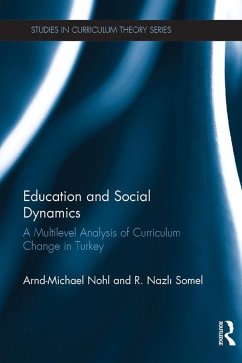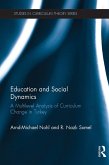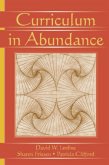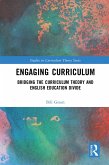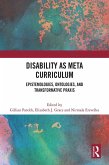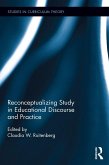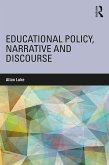Arnd-Michael Nohl, R. Nazli Somel
Education and Social Dynamics (eBook, ePUB)
A Multilevel Analysis of Curriculum Change in Turkey
29,95 €
29,95 €
inkl. MwSt.
Sofort per Download lieferbar

15 °P sammeln
29,95 €
Als Download kaufen

29,95 €
inkl. MwSt.
Sofort per Download lieferbar

15 °P sammeln
Jetzt verschenken
Alle Infos zum eBook verschenken
29,95 €
inkl. MwSt.
Sofort per Download lieferbar
Alle Infos zum eBook verschenken

15 °P sammeln
Arnd-Michael Nohl, R. Nazli Somel
Education and Social Dynamics (eBook, ePUB)
A Multilevel Analysis of Curriculum Change in Turkey
- Format: ePub
- Merkliste
- Auf die Merkliste
- Bewerten Bewerten
- Teilen
- Produkt teilen
- Produkterinnerung
- Produkterinnerung

Bitte loggen Sie sich zunächst in Ihr Kundenkonto ein oder registrieren Sie sich bei
bücher.de, um das eBook-Abo tolino select nutzen zu können.
Hier können Sie sich einloggen
Hier können Sie sich einloggen
Sie sind bereits eingeloggt. Klicken Sie auf 2. tolino select Abo, um fortzufahren.

Bitte loggen Sie sich zunächst in Ihr Kundenkonto ein oder registrieren Sie sich bei bücher.de, um das eBook-Abo tolino select nutzen zu können.
Education and Social Dynamics offers a new approach to analyzing curriculum change by investigating the entanglement of education and society in markedly heterogeneous Turkey, which has recently witnessed nation-wide curriculum reforms.
- Geräte: eReader
- mit Kopierschutz
- eBook Hilfe
- Größe: 11.2MB
Andere Kunden interessierten sich auch für
![Education and Social Dynamics (eBook, PDF) Education and Social Dynamics (eBook, PDF)]() Arnd-Michael NohlEducation and Social Dynamics (eBook, PDF)29,95 €
Arnd-Michael NohlEducation and Social Dynamics (eBook, PDF)29,95 €![Curriculum in Abundance (eBook, ePUB) Curriculum in Abundance (eBook, ePUB)]() David W. JardineCurriculum in Abundance (eBook, ePUB)48,95 €
David W. JardineCurriculum in Abundance (eBook, ePUB)48,95 €![Engaging Curriculum (eBook, ePUB) Engaging Curriculum (eBook, ePUB)]() Bill GreenEngaging Curriculum (eBook, ePUB)44,95 €
Bill GreenEngaging Curriculum (eBook, ePUB)44,95 €![Disability as Meta Curriculum (eBook, ePUB) Disability as Meta Curriculum (eBook, ePUB)]() Disability as Meta Curriculum (eBook, ePUB)40,95 €
Disability as Meta Curriculum (eBook, ePUB)40,95 €![Reconceptualizing Study in Educational Discourse and Practice (eBook, ePUB) Reconceptualizing Study in Educational Discourse and Practice (eBook, ePUB)]() Reconceptualizing Study in Educational Discourse and Practice (eBook, ePUB)41,95 €
Reconceptualizing Study in Educational Discourse and Practice (eBook, ePUB)41,95 €![A New Paradigm for Global School Systems (eBook, ePUB) A New Paradigm for Global School Systems (eBook, ePUB)]() Joel SpringA New Paradigm for Global School Systems (eBook, ePUB)41,95 €
Joel SpringA New Paradigm for Global School Systems (eBook, ePUB)41,95 €![Educational Policy, Narrative and Discourse (eBook, ePUB) Educational Policy, Narrative and Discourse (eBook, ePUB)]() Allan LukeEducational Policy, Narrative and Discourse (eBook, ePUB)44,95 €
Allan LukeEducational Policy, Narrative and Discourse (eBook, ePUB)44,95 €-
-
-
Education and Social Dynamics offers a new approach to analyzing curriculum change by investigating the entanglement of education and society in markedly heterogeneous Turkey, which has recently witnessed nation-wide curriculum reforms.
Dieser Download kann aus rechtlichen Gründen nur mit Rechnungsadresse in A, B, BG, CY, CZ, D, DK, EW, E, FIN, F, GR, HR, H, IRL, I, LT, L, LR, M, NL, PL, P, R, S, SLO, SK ausgeliefert werden.
Produktdetails
- Produktdetails
- Verlag: Taylor & Francis eBooks
- Seitenzahl: 296
- Erscheinungstermin: 27. August 2015
- Englisch
- ISBN-13: 9781317448136
- Artikelnr.: 43729652
- Verlag: Taylor & Francis eBooks
- Seitenzahl: 296
- Erscheinungstermin: 27. August 2015
- Englisch
- ISBN-13: 9781317448136
- Artikelnr.: 43729652
- Herstellerkennzeichnung Die Herstellerinformationen sind derzeit nicht verfügbar.
Arnd-Michael Nohl is Professor of Education at Helmut-Schmidt-Universität, Germany.
R. Nazli Somel is a PhD student at Helmut-Schmidt-Universität, Germany.
R. Nazli Somel is a PhD student at Helmut-Schmidt-Universität, Germany.
Preface
1. Introduction
2. Education and Social Change in Turkish History
2.1 What is Social and Educational Change?
2.2 The Formation of the Educational Sector in the Ottoman Empire
2.3 The Expansion and Differentiation of Laicist Education in Modern Turkey
2.4 Society and Education from 1980 to 2003
2.5 Change and Primary Education
3. The Curriculum Making
3.1 Studying Curriculum Change: Theoretical and Methodological
Considerations
3.2 Organizing a New Curriculum
3.3 The New Curriculum's Approach
3.4 Preliminary Conclusions
4. Divergent Curricular Practices of Organizational Milieus: Teachers'
Professional Generations
4.1 Analyzing Curricular Practices
4.2 The generation of experienced teachers
4.3 Novices and the curriculum
4.4 The intermediary position between generations
4.5 Distribution of Teachers and Schools' Prestige
5. Instruction and inequality between schools
5.1 Social milieu, school organization, and resources: theoretical
considerations
5.2 Prestigious schools with middle-class milieus
5.3 A maximal contrast: Instruction in a poor district of Istanbul
5.4 Rural schools with poor milieus
5.5 Reciprocally Amplifying Resources in Instruction Practices
6. The new curriculum in competition with other institutionalized
expectations
6.1 Institutionalizing the new curriculum
6.2 The informal institutionalization of standardized tests
6.3 The competitive combination of loosely and tightly coupled institutions
7. Conclusion: Change, education, and society
Appendix
Overview of the Turkish school system
Overview of expert interviews
Rules of Transcription
1. Introduction
2. Education and Social Change in Turkish History
2.1 What is Social and Educational Change?
2.2 The Formation of the Educational Sector in the Ottoman Empire
2.3 The Expansion and Differentiation of Laicist Education in Modern Turkey
2.4 Society and Education from 1980 to 2003
2.5 Change and Primary Education
3. The Curriculum Making
3.1 Studying Curriculum Change: Theoretical and Methodological
Considerations
3.2 Organizing a New Curriculum
3.3 The New Curriculum's Approach
3.4 Preliminary Conclusions
4. Divergent Curricular Practices of Organizational Milieus: Teachers'
Professional Generations
4.1 Analyzing Curricular Practices
4.2 The generation of experienced teachers
4.3 Novices and the curriculum
4.4 The intermediary position between generations
4.5 Distribution of Teachers and Schools' Prestige
5. Instruction and inequality between schools
5.1 Social milieu, school organization, and resources: theoretical
considerations
5.2 Prestigious schools with middle-class milieus
5.3 A maximal contrast: Instruction in a poor district of Istanbul
5.4 Rural schools with poor milieus
5.5 Reciprocally Amplifying Resources in Instruction Practices
6. The new curriculum in competition with other institutionalized
expectations
6.1 Institutionalizing the new curriculum
6.2 The informal institutionalization of standardized tests
6.3 The competitive combination of loosely and tightly coupled institutions
7. Conclusion: Change, education, and society
Appendix
Overview of the Turkish school system
Overview of expert interviews
Rules of Transcription
Preface
1. Introduction
2. Education and Social Change in Turkish History
2.1 What is Social and Educational Change?
2.2 The Formation of the Educational Sector in the Ottoman Empire
2.3 The Expansion and Differentiation of Laicist Education in Modern Turkey
2.4 Society and Education from 1980 to 2003
2.5 Change and Primary Education
3. The Curriculum Making
3.1 Studying Curriculum Change: Theoretical and Methodological
Considerations
3.2 Organizing a New Curriculum
3.3 The New Curriculum's Approach
3.4 Preliminary Conclusions
4. Divergent Curricular Practices of Organizational Milieus: Teachers'
Professional Generations
4.1 Analyzing Curricular Practices
4.2 The generation of experienced teachers
4.3 Novices and the curriculum
4.4 The intermediary position between generations
4.5 Distribution of Teachers and Schools' Prestige
5. Instruction and inequality between schools
5.1 Social milieu, school organization, and resources: theoretical
considerations
5.2 Prestigious schools with middle-class milieus
5.3 A maximal contrast: Instruction in a poor district of Istanbul
5.4 Rural schools with poor milieus
5.5 Reciprocally Amplifying Resources in Instruction Practices
6. The new curriculum in competition with other institutionalized
expectations
6.1 Institutionalizing the new curriculum
6.2 The informal institutionalization of standardized tests
6.3 The competitive combination of loosely and tightly coupled institutions
7. Conclusion: Change, education, and society
Appendix
Overview of the Turkish school system
Overview of expert interviews
Rules of Transcription
1. Introduction
2. Education and Social Change in Turkish History
2.1 What is Social and Educational Change?
2.2 The Formation of the Educational Sector in the Ottoman Empire
2.3 The Expansion and Differentiation of Laicist Education in Modern Turkey
2.4 Society and Education from 1980 to 2003
2.5 Change and Primary Education
3. The Curriculum Making
3.1 Studying Curriculum Change: Theoretical and Methodological
Considerations
3.2 Organizing a New Curriculum
3.3 The New Curriculum's Approach
3.4 Preliminary Conclusions
4. Divergent Curricular Practices of Organizational Milieus: Teachers'
Professional Generations
4.1 Analyzing Curricular Practices
4.2 The generation of experienced teachers
4.3 Novices and the curriculum
4.4 The intermediary position between generations
4.5 Distribution of Teachers and Schools' Prestige
5. Instruction and inequality between schools
5.1 Social milieu, school organization, and resources: theoretical
considerations
5.2 Prestigious schools with middle-class milieus
5.3 A maximal contrast: Instruction in a poor district of Istanbul
5.4 Rural schools with poor milieus
5.5 Reciprocally Amplifying Resources in Instruction Practices
6. The new curriculum in competition with other institutionalized
expectations
6.1 Institutionalizing the new curriculum
6.2 The informal institutionalization of standardized tests
6.3 The competitive combination of loosely and tightly coupled institutions
7. Conclusion: Change, education, and society
Appendix
Overview of the Turkish school system
Overview of expert interviews
Rules of Transcription
